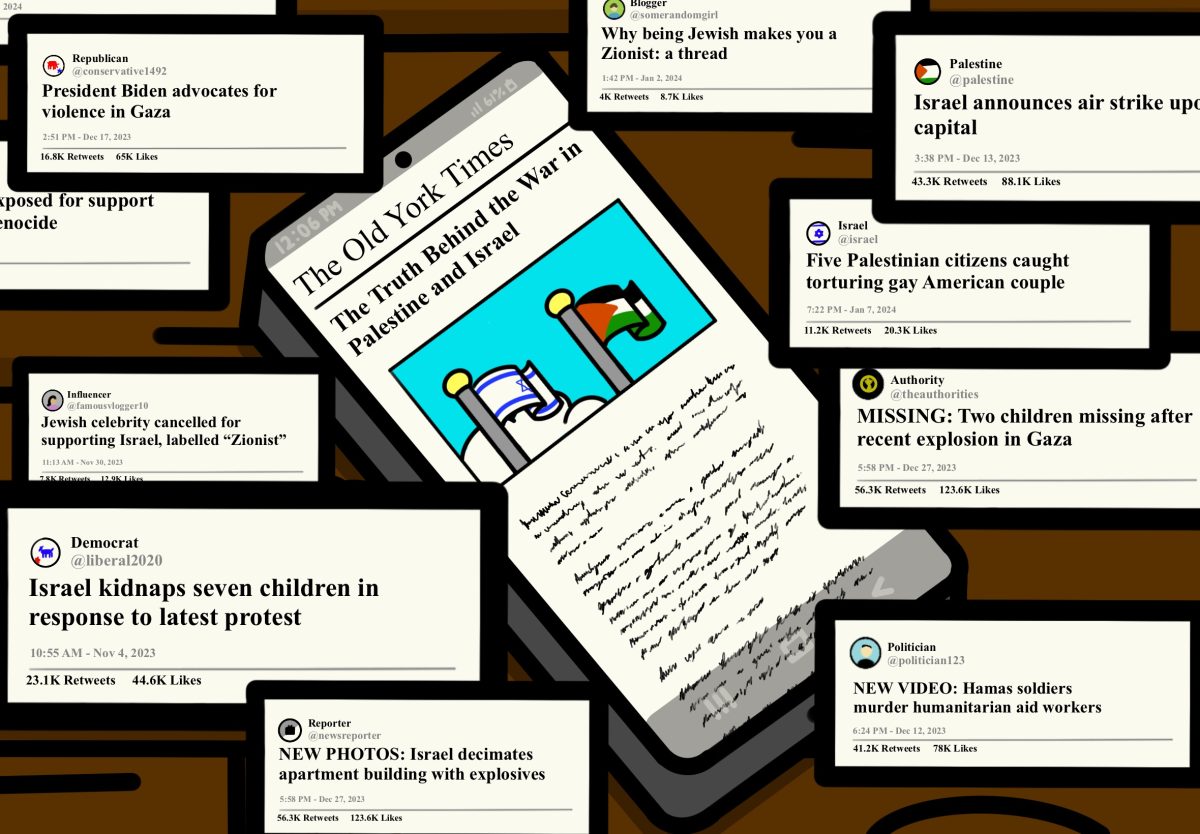Footage circulates on social media of a mob beating a young girl and lighting her on fire, purporting to be evidence of Hamas’s violence in Israel. However, reporting by The New York Times found that the video was shot in Guatemala in 2015 and showed a mob attacking a girl accused of involvement in the killing of a taxi driver.
As the war in Gaza continues to unfold, many have turned to social media to find firsthand footage and perspectives, often reposting this content as a way of bearing witness to the crisis and signaling one’s political stance. However, social media’s preference for engagement-driven, short-form content has led to the rampant spread of misinformation and inflammatory material about the war, which has distorted users’ perspectives and given way to false and hateful narratives.
The war in Gaza is a particularly polarizing issue due to the region’s complex history and the religious and ethnic tensions surrounding the conflict. According to Dr. Akan Malici, a professor of Politics and International Affairs at Furman University, the religious importance of Palestine in the Islamic faith, combined with decades of violence in the region, has caused this conflict to be felt as “an injustice towards all Arabs, not only Palestinians, and towards all Muslims also.”
This war is also personal for many Jewish people globally due to Judaism’s historical and religious ties to Israel. The Oct. 7 attack by Hamas, which incited the ongoing war, has led to fear amongst Israelis and the nation’s supporters, as well as a rise in antisemitism.
These tensions have been exacerbated by the spread of disinformation across social media platforms. Misleading content, including false claims and out-of-context footage from other conflicts, has circulated on platforms like YouTube, Facebook, Instagram, TikTok and X.
For example, a doctored document claiming to prove that Biden had dedicated $8 billion to assisting Israel has garnered 400,000 views on X, formerly known as Twitter.
A video of a Hamas militant shooting down an Israeli helicopter got 23,000 views, but was exposed as footage from the video game Arma 13.
Additionally, both Israel and Hamas have been accused of creating inauthentic accounts, or bot networks, to support their cause, according to BBC News. The spread of disinformation prompted the European Union to call attention to reports of illegal content through warnings sent to various social media companies in October 2023.
Analysts have found that some nations are spreading disinformation in an effort to exploit this conflict for political gain. The Institute for Strategic Dialogue has analyzed the narratives spread by Russia and Iran, and have found patterns of state-sponsored disinformation and inflammatory content. For example, Russian media has spread false claims that Ukraine provided weapons for Hamas in an attempt to stir aggression against both Ukraine and Hamas.
Disinformation, being used to both further political agendas and exploit conflict for views, makes social media a fundamentally unreliable source of information on this war. Misinformed perspectives caused by social media pose a danger to productive public discourse and political engagement, ultimately harming civilians suffering from this war.
“The danger is a continuously misinformed public that will not be able to evaluate the situation as it should evaluate the situation and, therefore, I think will not oppose sufficiently and fast enough to stop what is arguably a genocide,” Malici said.
The barrage of contradictory information can also contribute to a sense of distrust in resources about the war, according to Harvard University’s Misinformation Review, leaving users uncertain of where to turn for credible reporting.
Additionally, the oversaturation of media and the spread of disinformation can be a barrier for those investigating war crimes and providing aid. Because of how difficult it is to physically access the sites of atrocities, digital evidence is often integral to war crime investigations. Disinformation campaigns undermine the reliability and credibility of that evidence. Similarly, disinformation inhibits humanitarian organizations by making it difficult for them to identify areas in need of assistance or eroding public trust needed to effectively administer aid.
Inflammatory content distorts perceptions of the war by using footage of violence and suffering to push viewers to respond with aggression and extremism, exacerbating already raw emotions. The New York Times found that in the weeks following Oct. 7, about 18,000 posts calling for Gaza to be “erased,” “flattened,” or “destroyed” were uploaded to X. Similar language has been used in posts attacking Israel. These posts incorporate the rhetoric of ethnic cleansing and violence into mainstream politics, normalizing extremist views that can result in real-life danger for Jews and Muslims across the world.
Social media algorithms are engagement-driven at their core, feeding the viewer information that will either bolster their beliefs or incite anger. Many users repost information about the war in Gaza with the intention of spreading awareness and having a political impact while unintentionally promoting highly emotional or misleading content. This content contributes to an environment of aggressive debate that pushes users to take sides, making it harder for them to engage in productive discussion and action.
Before relying on social media for reports about the war in Gaza, it is important to scrutinize the content we consume and carefully consider what we repost and follow this conflict through more reliable sources, such as the live updates provided by the Associated Press. While our intentions may be good, we, as social media users, must take our role seriously in the spread of misinformation.




































